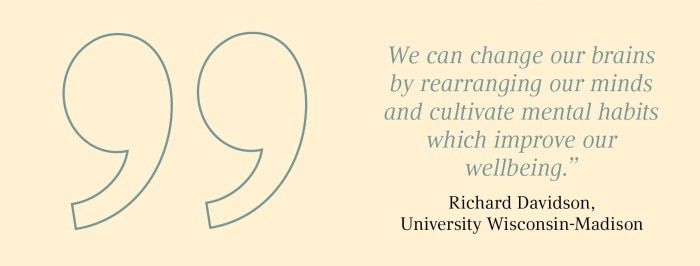MENU
CH | CHF
CH | CHF
-
- Benchtop Centrifuges
- Floor-Standing Centrifuges
- Refrigerated Centrifuges
- Microcentrifuges
- Multipurpose Centrifuges
- High-Speed Centrifuges
- Ultracentrifuges
- Concentrator
- High-Speed and Ultracentrifugation Consumables
- Accessories
- Tubes
- Plates
- Device Management Software
- Sample and Information Management
- IVD Products
No results found
Search Suggestions

Positivity - An Optimistic Outlook on Life
Beyond Science
- Nature
- Off the Bench
- Off the Bench
- Dossier
It is not always easy to “think positive” – and the benefits are limited when it comes to feeling better. Instead of tinting negative thoughts with a rose-colored brush, it is better to consciously guide one’s thoughts towards something truly positive.
He who expects the worst is prepared for any eventuality. And those who do not expect anything will not suffer disappointment. The motto of dyed-in-the wool pessimists is “If it can go wrong, it will go wrong”. And so, every morning, they are disillusioned all over again. The meeting with the boss: What’s the point? Brainstorming among colleagues? A waste of time. The end of their miserable day, filled with negative soliloquy, is most likely spent in front of the television where the evening news will serve to confirm their view of the world. “Why don’t you try thinking positive”, is what pessimists are often told. If it were only that simple. The glass is half full and not half empty! Think positive, and you will succeed! Every crisis is an opportunity! Supposedly encouraging advice such as this has been promoted by numerous self-help books, influencers and other well-meaning experts – and not only since the pandemic. In essence, what is being pushed is the effort to positively influence one’s thoughts on a continual basis. The hope behind this method of thinking, which is not a therapeutic measure in cases of depressive illness: a basic optimistic attitude leads to increased contentment and a happier life.
Optimists lead healthier lives
A positive outlook is indeed important for our well-being. For example, a team led by Alan Rozanski at Mount Sinai St Luke’s Hospital in New York, has shown that a fundamentally positive attitude lowers the risk of cardiovascular illness whereas pessimists have a higher risk of heart disease. Psychologist Martin Seligman of the University of Pennsylvania further discovered that pessimists who attribute their failures to personal weakness suffered more frequently from depression than people who chalked their failures up to experience and set out to do better next time. In a study looking at insurance salespeople, he even observed a connection between a positive attitude and performance: optimistic representatives sold 37 percent more policies than pessimists. A brain scan study conducted at Stanford University showed that positivity even enhances brain performance. The researchers studied the attitudes of elementary school students towards the subject of mathematics. They found out that a positive attitude towards the world of numbers allowed the brain to work faster when it came to calculations.
The caveat: a fundamentally positive attitude can hardly be achieved through positive thinking alone. First of all, especially those who tend to paint a bleak picture have a hard time turning their thinking around. Most of all, however, the advice to think positive often implies the suggestion of pushing bad feelings aside, with the result that this persistent embellishment suppresses negative emotions – which, according to studies, will potentially trigger stress.
Optimists lead healthier lives
A positive outlook is indeed important for our well-being. For example, a team led by Alan Rozanski at Mount Sinai St Luke’s Hospital in New York, has shown that a fundamentally positive attitude lowers the risk of cardiovascular illness whereas pessimists have a higher risk of heart disease. Psychologist Martin Seligman of the University of Pennsylvania further discovered that pessimists who attribute their failures to personal weakness suffered more frequently from depression than people who chalked their failures up to experience and set out to do better next time. In a study looking at insurance salespeople, he even observed a connection between a positive attitude and performance: optimistic representatives sold 37 percent more policies than pessimists. A brain scan study conducted at Stanford University showed that positivity even enhances brain performance. The researchers studied the attitudes of elementary school students towards the subject of mathematics. They found out that a positive attitude towards the world of numbers allowed the brain to work faster when it came to calculations.
The caveat: a fundamentally positive attitude can hardly be achieved through positive thinking alone. First of all, especially those who tend to paint a bleak picture have a hard time turning their thinking around. Most of all, however, the advice to think positive often implies the suggestion of pushing bad feelings aside, with the result that this persistent embellishment suppresses negative emotions – which, according to studies, will potentially trigger stress.
Read more
Read less

Stress though “toxic positivity”
If the pressure to think positive originates from external sources, there is a chance that it will even increase negative emotions. “An excessive emphasis on positivity in contrast to negativity can create an unachievable standard which, ironically, compromises individual wellbeing”, says Egon Dejonckheere at Tilburg University who, together with colleagues from 40 countries, published a multinational happiness study in the journal “Nature”. The perceived social pressure not to feel negative plays an inciting role in depression, states Dejonckheere. Especially in countries with a higher global happiness index, this high level of happiness carries disadvantages for some people: it increases their risk of depression. In this case, the pursuit of happiness and perfection has the opposite effect – a phenomenon that is currently discussed in social media and that is known as “toxic positivity”.
Depressive illnesses warrant professional treatment. If, on the other hand, the goal is a more positive outlook on life, positive psychology offers a promising alternative to positive thinking. The “science of a successful life” concerns itself with the positive aspects of being human, including happiness, optimism, a feeling of safety, trust, individual strengths, forgiveness and solidarity. In practice, positive psychology offers a positive fundamental attitude by intentionally directing one’s focus towards the true positive aspects of one’s life using regular exercises (see p. 20) – without blocking out the negative. A flower growing from concrete is capable of bringing as much joy on a miserable day as praise from a colleague or being complimented by our partner. And instead of being upset about a bad presentation, I focus on the positive: I conducted a successful conversation with a customer, and later I helped a friend.
Moving away from weaknesses and deficits
Whereas in the second half of the 20th century, psychology focused on human “deficits”, towards the end of the 1990s, Martin Seligman, then president of the American Psychological Association (APA), was the first to emphasize the advantages of “positivity” with respect to a sense of happiness, health and success. Since that time, this approach has also been dominating psychological research. Numerous studies indicate that our positive emotions help us navigate the difficulties of life more easily. Especially those who learned to view the world as a good place early on will have an easier time in life, found a team led by Angela Lee Duckworth at the University of Pennsylvania. People did better in life who thought that while the world posed dangers, it was overall a good place.
Unfortunately, many of us are not blessed with such a sunny disposition as evolution has taught us to be alert and prepared for danger at all times. When we humans still had to flee the sabre tooth tiger and our lives were constantly at risk, the “fight-or-flight” reaction secured our survival. This focus on threats has become an integral part of our brains. In the modern world, however, it is the cause of much unnecessary pessimism as our lives are rarely in actual danger. Instead, stress and negative thinking harm our health – and therefore, we ourselves represent the largest obstacle on the path to more positivity.
If the pressure to think positive originates from external sources, there is a chance that it will even increase negative emotions. “An excessive emphasis on positivity in contrast to negativity can create an unachievable standard which, ironically, compromises individual wellbeing”, says Egon Dejonckheere at Tilburg University who, together with colleagues from 40 countries, published a multinational happiness study in the journal “Nature”. The perceived social pressure not to feel negative plays an inciting role in depression, states Dejonckheere. Especially in countries with a higher global happiness index, this high level of happiness carries disadvantages for some people: it increases their risk of depression. In this case, the pursuit of happiness and perfection has the opposite effect – a phenomenon that is currently discussed in social media and that is known as “toxic positivity”.
Depressive illnesses warrant professional treatment. If, on the other hand, the goal is a more positive outlook on life, positive psychology offers a promising alternative to positive thinking. The “science of a successful life” concerns itself with the positive aspects of being human, including happiness, optimism, a feeling of safety, trust, individual strengths, forgiveness and solidarity. In practice, positive psychology offers a positive fundamental attitude by intentionally directing one’s focus towards the true positive aspects of one’s life using regular exercises (see p. 20) – without blocking out the negative. A flower growing from concrete is capable of bringing as much joy on a miserable day as praise from a colleague or being complimented by our partner. And instead of being upset about a bad presentation, I focus on the positive: I conducted a successful conversation with a customer, and later I helped a friend.
Moving away from weaknesses and deficits
Whereas in the second half of the 20th century, psychology focused on human “deficits”, towards the end of the 1990s, Martin Seligman, then president of the American Psychological Association (APA), was the first to emphasize the advantages of “positivity” with respect to a sense of happiness, health and success. Since that time, this approach has also been dominating psychological research. Numerous studies indicate that our positive emotions help us navigate the difficulties of life more easily. Especially those who learned to view the world as a good place early on will have an easier time in life, found a team led by Angela Lee Duckworth at the University of Pennsylvania. People did better in life who thought that while the world posed dangers, it was overall a good place.
Unfortunately, many of us are not blessed with such a sunny disposition as evolution has taught us to be alert and prepared for danger at all times. When we humans still had to flee the sabre tooth tiger and our lives were constantly at risk, the “fight-or-flight” reaction secured our survival. This focus on threats has become an integral part of our brains. In the modern world, however, it is the cause of much unnecessary pessimism as our lives are rarely in actual danger. Instead, stress and negative thinking harm our health – and therefore, we ourselves represent the largest obstacle on the path to more positivity.
Read more
Read less

Our brains never stop learning
Will the pessimists among us be able to succeed in focusing on the positive? The good news is: Yes! “We can change our brains by rearranging our minds and cultivate mental habits which improve our wellbeing”, says Richard Davidson from the University Wisconsin-Madison. Characteristics such as resilience, empathy and emotional stability are anchored in our brains, and they can be shaped and changed through experience and training. According to Davidson, mental training with the goal of supporting wellbeing will have positive effects, for example, in the workplace – including leadership, creativity, staff health, productivity and collaboration.
No therapy is required in order to learn positivity – only regular practice. For example, the free App “Healthy Minds Program”, developed by Davidson and his team, is designed to help people make positive changes in their lives with only five minutes of mindfulness training per day. The everyday methods of positive psychology (see p. 20) often show remarkable effects: cannabis users who, during the course of a study, identified three positive aspects of their lives every evening for two weeks, went on to consume considerably less cannabis. Whether by App or using everyday methods: regular exercises make the difference. This is how the brain can be trained to focus on the positive. Sticking with it is worth it.
Will the pessimists among us be able to succeed in focusing on the positive? The good news is: Yes! “We can change our brains by rearranging our minds and cultivate mental habits which improve our wellbeing”, says Richard Davidson from the University Wisconsin-Madison. Characteristics such as resilience, empathy and emotional stability are anchored in our brains, and they can be shaped and changed through experience and training. According to Davidson, mental training with the goal of supporting wellbeing will have positive effects, for example, in the workplace – including leadership, creativity, staff health, productivity and collaboration.
No therapy is required in order to learn positivity – only regular practice. For example, the free App “Healthy Minds Program”, developed by Davidson and his team, is designed to help people make positive changes in their lives with only five minutes of mindfulness training per day. The everyday methods of positive psychology (see p. 20) often show remarkable effects: cannabis users who, during the course of a study, identified three positive aspects of their lives every evening for two weeks, went on to consume considerably less cannabis. Whether by App or using everyday methods: regular exercises make the difference. This is how the brain can be trained to focus on the positive. Sticking with it is worth it.
Read more
Read less

